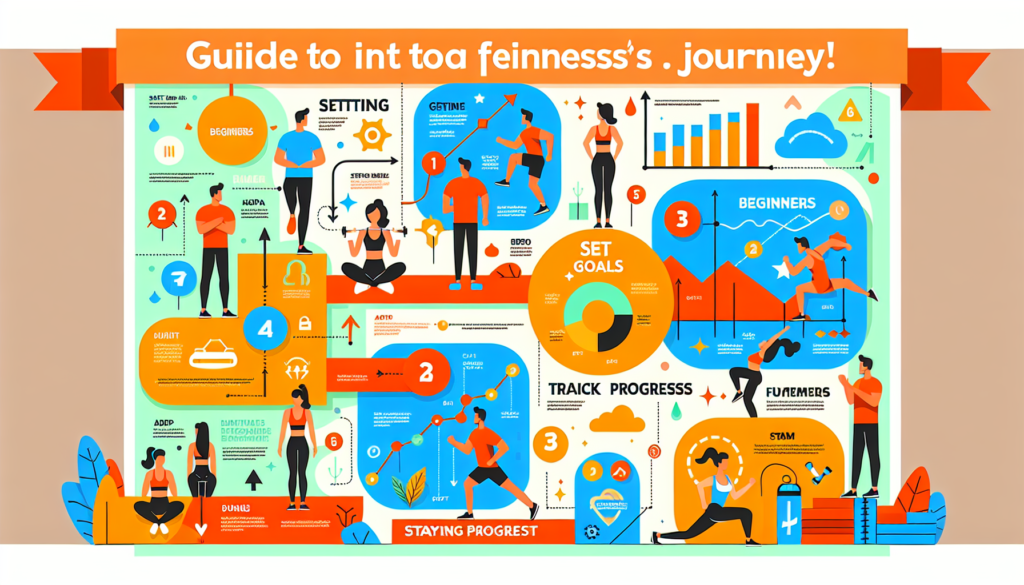Tips for Starting Your Fitness Journey
Embarking on a fitness journey can be both exciting and daunting. Whether you’re looking to shed some pounds, gain muscle, or simply improve your overall well-being, taking that first step towards a healthier lifestyle is crucial. In this article, you will discover essential tips to jumpstart your fitness journey and set yourself up for success. From setting realistic goals to finding activities you enjoy, these tips will help you navigate the initial challenges and ensure a smooth start to your path towards a fitter, healthier you. So, lace up your sneakers, grab a water bottle, and get ready to embark on an incredible adventure towards a better version of yourself.

Setting Goals
Determining Your Why
Before starting your fitness journey, it’s important to determine your “why” – the reason behind your desire to improve your health and fitness. This could be anything from wanting to have more energy, achieving a certain aesthetic, or improving your overall well-being. By identifying your motivation, you can create a sense of purpose and stay committed when faced with challenges along the way.
Setting Realistic Goals
When setting fitness goals, it’s crucial to be realistic and not set the bar too high. While having ambitious goals can be motivating, unrealistic expectations can lead to frustration and disappointment. Start by setting achievable short-term goals and gradually work towards long-term goals. For example, aiming to increase the number of push-ups you can do in a week is more attainable than expecting to have a six-pack in a month. Remember, progress takes time and patience is key.
Short-term and Long-term Goals
It’s important to set both short-term and long-term fitness goals to keep yourself motivated and give you a sense of direction. Short-term goals are milestones that you can accomplish within a relatively short period, such as losing a certain amount of weight or running a specific distance. Long-term goals, on the other hand, are the ultimate achievements you aspire to reach over a longer period, like participating in a marathon or maintaining a healthy lifestyle for years to come. Having a combination of short-term and long-term goals allows you to celebrate small victories and stay focused on the bigger picture.
Creating a Plan
Consulting with a Doctor
Before embarking on any fitness journey, it’s always a good idea to consult with your doctor or a healthcare professional. They can evaluate your current health status and provide guidance on safe and appropriate exercise options for your individual circumstances. It’s especially important to consult a doctor if you have any underlying medical conditions or haven’t been physically active for an extended period.
Identifying Preferred Activities
Finding activities that you enjoy is crucial in sticking to a fitness plan. Consider your interests and preferences when choosing your workouts. If you love dancing, try signing up for a dance class or joining a local dance group. If you prefer the outdoors, explore options like hiking, cycling, or running. The key is to choose activities that bring you joy and make you excited to exercise.
Establishing a Workout Schedule
Consistency is key when it comes to achieving your fitness goals. Set aside dedicated time for exercise and create a weekly workout schedule. This will help you stay organized and ensure that you prioritize your health and well-being. Whether it’s early morning workouts or evening sessions, find a time that works best for your schedule and stick to it as much as possible.
Building Progression
Progression is an essential element of any fitness plan. As you become more comfortable with your workouts and start to see improvements, it’s essential to challenge yourself and take your fitness to the next level. Gradually increase the intensity, duration, or frequency of your workouts to keep seeing progress. This could involve adding more weight to your strength training exercises, increasing the speed or distance of your runs, or trying more advanced variations of your favorite workouts.
Building a Support System
Finding an Accountability Partner
Having someone to hold you accountable can greatly improve your chances of sticking to your fitness journey. Find a friend, family member, or workout buddy who shares your goals or is also on their own fitness journey. This person can provide support, motivation, and encouragement when you’re feeling low or tempted to skip a workout. With an accountability partner, you’ll have someone to celebrate your successes with and to keep you accountable when the going gets tough.
Joining Fitness Communities
Joining fitness communities, whether in-person or online, can provide an incredible support system. Connect with like-minded individuals who share similar goals and are also passionate about improving their health. Engaging in fitness communities can provide a sense of belonging, inspiration, and valuable advice. You can participate in group workouts, share your progress, ask questions, and learn from others’ experiences.
Involving Friends and Family
Involving your friends and family in your fitness journey can be a fun and effective way to stay motivated. Invite them to join you in your workouts, whether it’s going for a walk, trying a new fitness class together, or simply cheering each other on. By incorporating fitness activities into your social life, you’ll create a supportive and enjoyable environment that helps you stay committed and engaged in your goals.
Starting Slowly
Listening to Your Body
When starting your fitness journey, it’s crucial to listen to your body and honor its limits. Be mindful of any discomfort, pain, or fatigue and adjust your workouts accordingly. Pushing too hard too soon can lead to injuries or burnout. Gradually increase the intensity and duration of your workouts, allowing your body time to adapt and recover.
Beginner-friendly Workouts
Starting with beginner-friendly workouts is a great way to ease into your fitness journey. Look for workout routines or classes specifically designed for beginners, which typically focus on building strength, flexibility, and cardiovascular endurance. These workouts often include modifications for different fitness levels, ensuring that you can participate safely and comfortably.
Gradual Increase in Intensity
As you progress in your fitness journey, gradually increase the intensity of your workouts to challenge your body and continue making progress. This can be done by adding more resistance, increasing the speed or duration of your cardio workouts, or incorporating more challenging exercises into your routine. However, it’s essential to do this gradually and ensure that you allow for proper recovery between workouts to avoid overexertion or injuries.
Nutrition and Hydration
Eating a Balanced Diet
A balanced diet is a key component of a successful fitness journey. Fueling your body with nutrient-rich foods provides the energy it needs for physical activity and supports overall health. Aim to consume a variety of lean proteins, whole grains, fruits, vegetables, and healthy fats. Avoid overly processed foods and prioritize fresh, whole foods whenever possible.
Understanding Caloric Needs
Understanding your caloric needs is important when it comes to maintaining a healthy weight and supporting your fitness goals. It’s essential to consume the right number of calories to fuel your workouts without overeating or under-eating. Consult a nutritionist or use online calculators to determine the appropriate calorie intake based on your age, gender, height, weight, and activity level.
Importance of Protein
Protein plays a crucial role in muscle repair and growth, making it an essential component of a fitness journey. Ensure that you’re consuming enough protein to support your body’s needs. Good sources of protein include lean meats, poultry, fish, dairy products, legumes, and plant-based proteins like tofu and tempeh. Consider incorporating protein-rich snacks or meals into your diet before and after workouts to enhance recovery and muscle development.
Staying Hydrated
Staying hydrated is vital for optimal performance during workouts and overall health. Aim to drink an adequate amount of water throughout the day, especially before, during, and after exercise. Dehydration can lead to decreased energy levels, muscle cramps, and impaired physical performance. Invest in a reusable water bottle and keep it with you at all times to remind yourself to stay hydrated.
Tracking Progress
Keeping a Workout Journal
Keeping a workout journal can be a valuable tool to track your progress and stay motivated. Write down your workouts, including the exercises, sets, reps, and any notes related to how you felt during the session. Tracking your workouts allows you to see improvements over time, identify patterns, and make adjustments if needed. It can also serve as a source of inspiration and a reminder of how far you’ve come.
Measuring Body Metrics
In addition to tracking your workouts, measuring certain body metrics can provide objective data on your progress. Consider measuring metrics such as weight, body measurements, body fat percentage, or even taking progress photos. However, keep in mind that the scale or specific measurements alone do not define your progress. Focus on how you feel physically and mentally, rather than solely relying on numbers.
Utilizing Fitness Apps
Fitness apps can be an excellent resource for tracking progress, accessing workout routines, and staying motivated. There are various apps available that allow you to log your workouts, set goals, track nutrition, and even compete with friends or join virtual challenges. Find an app that aligns with your preferences and goals, and utilize its features to enhance your fitness journey.
Staying Motivated
Rewarding Yourself
Rewarding yourself along the way is an effective way to stay motivated on your fitness journey. Set milestones or goals and choose rewards that align with your interests. Treat yourself to something you enjoy, like a massage, new workout clothes, a day off from exercise, or a special meal. Celebrating your achievements, no matter how small, can boost your morale and provide an extra incentive to keep going.
Setting Milestones
Setting milestones throughout your fitness journey allows you to break down your ultimate goal into more manageable segments. These milestones can be personal records, specific achievements, or even non-fitness-related milestones that align with your overall well-being. By focusing on smaller, attainable goals, you can regularly experience the satisfaction of progress and maintain motivation throughout your journey.
Celebrating Achievements
Along with setting milestones, it’s crucial to celebrate your achievements. Take the time to acknowledge and appreciate your progress. Reflect on how far you’ve come, whether it’s completing a challenging workout, reaching a weight-loss milestone, or feeling stronger and healthier. Share your achievements with your support system, and indulge in a small celebration to cherish your hard work and dedication.
Overcoming Challenges
Dealing with Setbacks
Facing setbacks is a normal part of any fitness journey. It’s important to approach setbacks with a positive mindset and see them as temporary obstacles instead of failures. Instead of dwelling on setbacks, focus on what you can learn from them and use them as opportunities for growth and improvement. Remember that setbacks are a natural part of the process, and with perseverance, you can overcome them.
Adjusting Plans
Sometimes, adjustments to your fitness plans are necessary to adapt to changing circumstances or new goals. Be flexible and willing to modify your workouts or routines as needed. If a particular exercise isn’t working for you or you need to change your workout schedule, don’t be afraid to adjust. Listen to your body and make modifications that suit your current needs and preferences.
Maintaining Consistency
Consistency is often the biggest challenge when it comes to maintaining a fitness journey. Life can get busy, and it’s easy to make excuses or let other responsibilities take priority. However, it’s important to prioritize your health and make exercise a non-negotiable part of your routine. Find ways to incorporate physical activity into your daily life, even if it means starting with shorter workouts or finding creative solutions when time is limited. Consistency is key to achieving long-term success.
Educating Yourself
Researching Fitness Resources
Continuing to educate yourself about fitness is important to stay informed and make informed decisions about your health and well-being. Subscribe to reputable fitness blogs, follow experts on social media, and read books or articles on exercise and nutrition. Stay up to date with the latest research and trends in the fitness industry, but always approach new information critically and consult professionals for personalized advice.
Learning Proper Form
Learning proper form is crucial to prevent injuries and maximize the effectiveness of your workouts. If you’re new to exercise or trying new exercises, consider working with a qualified fitness professional or joining a beginner-friendly class. They can guide you through the correct technique and help you understand how to execute exercises safely and efficiently.
Understanding Exercise Principles
Understanding exercise principles allows you to design effective workouts and make informed decisions about your fitness routine. Learn about the principles of cardiovascular exercise, strength training, flexibility, and functional movement. This knowledge will help you tailor your workouts to your goals, prevent plateaus, and ensure that you’re working towards a well-rounded and balanced fitness routine.
Exploring Training Techniques
Exploring different training techniques can add variety to your fitness routine and challenge your body in new ways. Experiment with different workout styles, such as high-intensity interval training (HIIT), circuit training, Pilates, yoga, or kickboxing. Trying new techniques not only keeps your workouts exciting but can also help you discover new activities that you enjoy and that target different aspects of fitness.
Listening to Your Body
Rest and Recovery
Rest and recovery are essential components of a successful fitness journey. Incorporate rest days into your workout schedule to allow your body time to repair and rebuild. Overtraining can lead to fatigue, decreased performance, and increased risk of injury. Listen to your body and take breaks when needed. This doesn’t mean laziness but rather a smart approach to optimize your results.
Recognizing Signs of Overtraining
It’s important to recognize the signs of overtraining to prevent burnout and injury. Some common signs of overtraining include persistent muscle soreness, decreased performance, insomnia, decreased appetite, mood swings, and an increased resting heart rate. If you’re experiencing these symptoms, take a step back and give your body the rest and recovery it needs.
Adapting to Your Limitations
Everyone has different limitations, whether physical, mental, or due to personal circumstances. It’s important to adapt your fitness journey to suit your individual needs and capabilities. Modify exercises to accommodate any physical limitations or injuries. Don’t compare yourself to others and focus on making progress at your own pace. Remember, this journey is about improving YOUR health and well-being, not trying to match the achievements of others.
Starting a fitness journey can be overwhelming, but with the right mindset, planning, and support system, you can achieve your health and fitness goals. Remember to determine your why, set realistic goals, create a workout plan, build a support system, start slowly, prioritize nutrition and hydration, track your progress, stay motivated, overcome challenges, educate yourself, and most importantly, listen to your body. Stay patient, stay consistent, and enjoy the journey of becoming a healthier and happier version of yourself. You’ve got this!

















It's great that you talked about how business insurance can provide financial protection against unexpected events and help ensure the…
I like that you mentioned how business insurance is essential for protecting your bottom line and the long-term viability of…